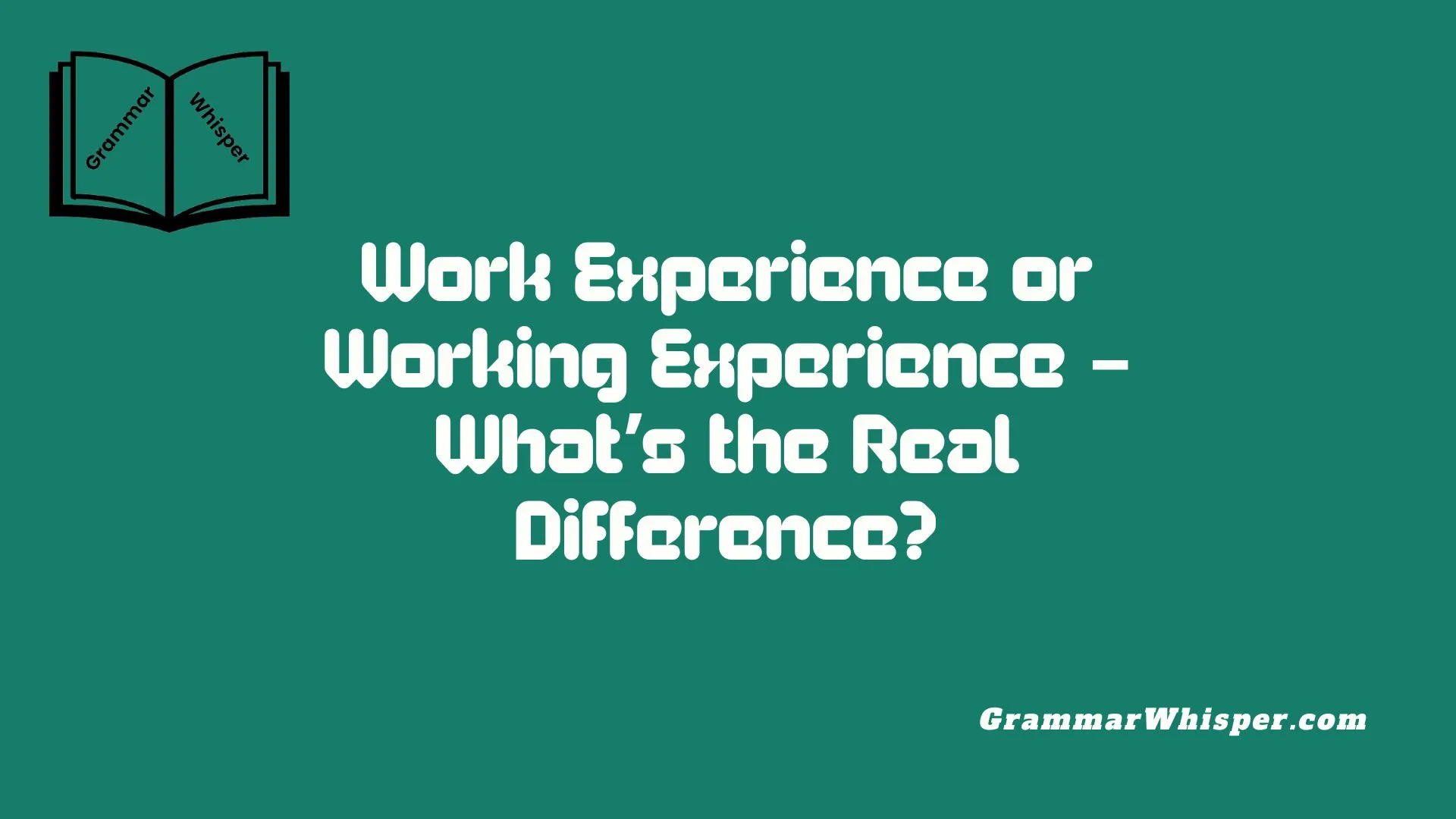Helping a friend draft his resume recently brought an unexpected challenge to light: whether to write work experience or working experience. At first, it seemed like a minor detail, just another phrase on the page. But in truth, that choice shifts the entire tone of your application. The correct expression not only signals mastery of language, but also tells hiring managers you understand professional expectations. In a competitive job market, small errors can chip away at your confidence – especially when your resume has to pass through applicant tracking systems (ATS) before a single human lays eyes on it. I’ve seen even polished applications fall short just because the wording sounded less professional.
Over years of professional writing guidance, I’ve seen one thing hold true: work experience is the industry standard. It fits seamlessly with the expectations of modern HR and recruitment teams. Meanwhile, “working experience” introduces subtle confusion, even when technically acceptable in grammar. What works best is what’s most proven. The real success stories, the real-world wins? They come from candidates who understand and follow strong grammar rules, use practical tips, and rely on an expert guide. Simple changes can be the difference between sounding uncertain or like a seasoned pro in the workplace.
Why the Confusion Exists: Work vs. Working
This mix-up often stems from a surface-level understanding of English grammar. While “work experience” is the universally accepted phrase, some learners substitute “working experience” due to grammatical assumptions or translation influences.
Here’s the grammar breakdown:
- Work (noun) + experience (noun): a compound noun structure
- Working (present participle/adjective) + experience (noun): a descriptive noun phrase
It may seem small, but the difference affects formality and clarity in communication.
What Does “Work Experience” Actually Mean?
“Work experience” refers to the knowledge, skills, and accomplishments someone gains through employment. It’s a standard term used globally in resumes, cover letters, and job interviews.
Definitions from top sources:
- Oxford Dictionary: The experience someone has of working in a particular job or industry.
- Cambridge Dictionary: The jobs that someone has done in the past, especially those that show they have suitable experience for a job.
Where it’s used:
- Resume section headers
- LinkedIn job history
- Professional bios
- Job application forms
- HR documentation
If you’re applying for a job, this is the only version you should use.
Is “Working Experience” a Real Term?
Yes, but it’s not preferred in formal or professional settings. “Working experience” might appear in spoken English, translated documents, or informal conversation, but it sounds non-native or awkward to most employers.
Here’s why:
- “Working” functions as an adjective that modifies “experience” but doesn’t carry the same conventional weight.
- It implies experience while working rather than the body of work accumulated.
Example:
- “I had working experience in a bakery during school.” – sounds informal or regionally influenced.
- “I have work experience in retail management.” – polished, direct, standard.
Work Experience vs. Working Experience – The Key Differences
Here’s a visual table that sums it up:
| Feature | Work Experience | Working Experience |
| Grammar | Noun + Noun | Adjective + Noun |
| Accepted in resumes | ✅ Yes | ❌ No |
| Used in job applications | ✅ Yes | ❌ No |
| Found in job postings | ✅ Common | ❌ Rare |
| Sounds native/professional | ✅ Yes | ❌ No |
| Used globally | ✅ US, UK, Canada, EU, Australia | ❌ Limited/informal regions |
| Example | Work experience in accounting | Working experience in spreadsheets |
Bottom line: Only use work experience in resumes and career-related writing. Using “working experience” might sound like an ESL error – even if grammatically “acceptable” in casual English.
How These Terms Are Used Globally
In the US and UK:
- Work experience is standardized in all corporate, academic, and professional settings.
- “Working experience” would raise red flags for recruiters.
In Asia (India, China, Philippines):
- “Working experience” is sometimes used due to direct translation from local languages.
- Still, multinational companies and global job portals expect “work experience.”
Real Examples:
- ✅ Resume: Work Experience – Software Developer, 2021–2023
- ❌ Resume: Working Experience – Assistant Manager (sounds odd)
Misconceptions Fueled by Translation
Many non-native English speakers rely on tools like Google Translate or mimic local patterns. This leads to direct translation of terms like:
- Chinese: 工作经验 (literal: working experience)
- Spanish: experiencia laboral
- Korean: 근무 경험 (translated: working experience)
While the intention is right, the output doesn’t align with professional English standards.
Quick Rule of Thumb:
If you’re writing in English for a global audience, stick with “work experience.”
Grammar Deep Dive: Noun vs. Adjective Forms
Work Experience:
- “Work” = noun
- “Experience” = noun
- Combined: noun compound (commonly used in English)
Working Experience:
- “Working” = present participle used as adjective
- “Experience” = noun
- Sounds like an ongoing or partial experience (less concrete)
Example in practice:
I have work experience at a consulting firm. ✅ I have working experience at a consulting firm. ❌
Even though the second sentence is grammatically correct, it sounds off and unnatural in business English.
How Employers Interpret the Two Terms
Hiring managers, especially in English-speaking countries, are trained to spot:
- Unclear phrasing
- Language errors
- Unfamiliar expressions
Using “working experience” may:
- Signal that the candidate is not fluent
- Suggest a resume written without native proofreading
- Trigger filters in ATS (Applicant Tracking Systems)
Recruiter insights:
“When I see ‘working experience’ on a resume, I assume the applicant didn’t get it professionally reviewed.” – Senior Recruiter, LinkedIn Talent Solutions
Resume Best Practices: Always Use “Work Experience”
Your resume is often your first impression. Here’s how to structure this section:
Correct Heading:
Work Experience
Sample Entries:
Software Engineer – Google LLC (2021–2023) Led cross-functional development on cloud-based AI solutions.
Customer Service Associate – Amazon (2018–2021) Managed inbound queries with a 95% customer satisfaction score.
When Might You Hear “Working Experience” Used?
There are a few exceptions – mainly spoken English or educational contexts.
Examples:
- “I gained working experience in a lab as a student.”
- “She has working experience with disabled children.”
Still, it’s best to revise these to:
- “She has work experience supporting special needs students.”
Tips to Avoid the Mistake in Job Applications
- Proofread carefully before submitting.
- Use tools like:
- Grammarly
- Hemingway Editor
- Native-speaker editing services
- Avoid translating phrases directly – rewrite them using standard business English.
AI Detection & Language Proofing in Modern Hiring
With the rise of AI-assisted recruitment, even small errors in wording can make or break your application.
What modern ATS tools look for:
- Clarity
- Industry-specific keywords
- Standardized section titles (like “Work Experience”)
Mislabeling your resume section as “working experience” could lead to lower ATS rankings or even automated rejection.
Quotes from Language Experts
“Work experience is the globally recognized standard term for employment history on a resume.” – Oxford Lexico
“While grammatically possible, ‘working experience’ does not reflect native business English. Use ‘work experience’ instead.” – Grammarly Style Guide
“Precision in terminology shows precision in thought. Always choose the term that professionals recognize.” – HR Executive, Glassdoor
Final Verdict: Stick with ‘Work Experience’ for Professional Use
To summarize:
- ✅ “Work experience” is correct, clear, and expected.
- ❌ “Working experience” sounds off and can hurt your credibility.
- 📌 Use “work experience” in resumes, LinkedIn profiles, and job interviews.
- 🧠 Avoid direct translations and proofread for tone, grammar, and clarity.
Mini Quiz: Work Experience vs. Working Experience
Fill in the blank using the correct phrase:
- My _____ includes five years in digital marketing.
- She listed her _____ in the education sector.
- He has significant _____ in technical sales.
- This role requires three years of relevant _____.
- The hiring manager praised her _____.
Final Thoughts
In the world of resumes, applications, and professional communication, precision matters. While both “work experience” and “working experience” may seem interchangeable, only one is widely recognized, accepted, and respected in formal English. Whether you’re applying for your first job or updating your LinkedIn profile, always choose “work experience” to sound confident, polished, and professional.
Remember, using the right language isn’t just about grammar – it’s about creating the kind of impression that gets you noticed and remembered. Choose wisely, write clearly, and let your work experience speak for itself.
FAQs
What is the difference between work experience and working experience?
Work experience is the standard, accepted phrase for job history used in resumes and professional contexts. Working experience is grammatically possible but considered non-standard and is rarely used in formal English. The former is used globally, while the latter appears mostly in translations or informal speech.
Can I use “working experience” on my resume?
No. You should avoid using “working experience” on a resume. It’s not considered correct by recruiters, employers, or applicant tracking systems (ATS). Always use “work experience” to stay aligned with professional norms.
Why do some people say “working experience”?
The phrase “working experience” often comes from direct translations in non-English-speaking countries. Languages like Chinese, Korean, or Spanish may structure experience terms differently, leading to errors in English. It’s a common ESL mistake.
Is “working experience” ever acceptable?
It may appear in informal speech or in educational contexts (e.g., “working experience in labs”), but even then, “work experience” is better. It sounds more natural and avoids confusion or awkward phrasing.
How can I remember which one to use?
Here’s a simple rule:
If you’re writing a resume or applying for a job – always say “work experience.”
Think: “Work experience = professional.” “Working experience” might be grammatically okay, but it’s not what professionals expect to see.











